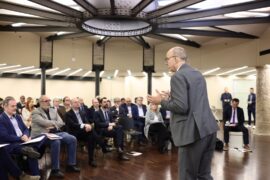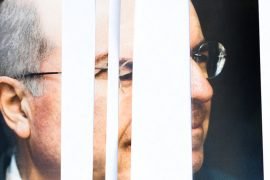[dropcap letter=”I'”]
n August 1989 the Scorpions performed at Lenin Stadium in Moscow at the Music Peace Festival. A few weeks later, they wrote and composed The wind of change, one of the most successful ballads of all times, inspired by those two days of mega concert. The first lines in the song refer to it when they say I follow the Moskva / Down to Gorky Park / Listening to the wind of change.
 Back then the world was heading for a sudden change. On 9 November of the same year, media pressure forced the tv channel in West Germany to crack the news –previously transmitted incomplete by the regime’s spokesperson– that the frontier between both Germanies had been opened immediately for everyone. This brought about an avalanche of citizens before the wall. People were asking the guards to open up the doors. Uncertainty built up and fed the courage that allowed to overthrow, ahead of schedule, the absurd situation that divided Berlin. This put an end to a period marked by armed conflicts and authoritarian supremacy begun in 1936, with the military uprising against the Republican Spain followed by the outbreak of the Spanish civil war.
Back then the world was heading for a sudden change. On 9 November of the same year, media pressure forced the tv channel in West Germany to crack the news –previously transmitted incomplete by the regime’s spokesperson– that the frontier between both Germanies had been opened immediately for everyone. This brought about an avalanche of citizens before the wall. People were asking the guards to open up the doors. Uncertainty built up and fed the courage that allowed to overthrow, ahead of schedule, the absurd situation that divided Berlin. This put an end to a period marked by armed conflicts and authoritarian supremacy begun in 1936, with the military uprising against the Republican Spain followed by the outbreak of the Spanish civil war.
A catastrophe in Moscow! The gigantic Maksim Gorky has had a terrible accident! There are no survivors! Later on, De Saucin, in an interview she declared that she had felt that Toni –this was the way she used to call her husband– had survived. And indeed he had survived. The loving passenger was Antoine de Saint-Exupéry
Shortly after the Francoist uprising died Maksim Gorky, the Russian writer who gave name to the park in the Scorpions’ song. Gorky was also the name given to the spectacular Russian spaceship (Tupolev ANT-20) that on 18 May 1935 became the focus of a dramatic accident in the Russian sky. During an exhibition flight, the ship crashed into a smaller fighter jet and fell on the outskirts, a few metres off the station where, three days before, the first metro line had been inaugurated. This line would become the shelter of a large part of population during the Nazi Luftwaffe bombings. That day, on 18 May 1935, the crashed Tupolev should have had a lovely passenger. When Consuelo de Saucin, the passenger’s wife, found out about the accident, she was in a Parisian bar having a drink with friends. She heard the paperboy announcing a special edition: extra! A catastrophe in Moscow! The gigantic Maksim Gorky has had a terrible accident! There are no survivors! Later on, De Saucin, in an interview she declared that she had felt that Toni –this was the way she used to call her husband– had survived. And indeed he had survived. The loving passenger was Antoine de Saint-Exupéry and, this time, he had dodged death by putting forward a few hours his exploratory flight with the crashed Tupolev. At the time, Saint-Exupéry was in Moscow working as a reporter for the Parisian newspaper Paris-Soir. This allowed him a more accurate analysis of the different points of political tension of that time.

Months later in 1935, reckless Saint-Exupéry was forced to do an emergency manoeuvre on the desert between Libya and Egypt. His commercial plane broke down in mid-flight, and the accident that followed became the preamble of the book he wrote during his exile years in the US. The book was first edited in 1943 in New York, 75 years ago, and has become the most translated book in history –358 languages and dialects–. The book is, of course, The Little Prince.
Saint-Exupéry was a tormented soul who felt lonely, as reflected at different stages of his work. He strived to recover the dignity of man, spiritual values, and fraternity and aimed to communicate the need to abandon pointless selfishness. He did his best to attain this endeavour, allegory after allegory, just like a Russian matryoshka doll, the wooden Russian doll, hollowed out, empty as it hides a smaller doll, that in turn has an even smaller one, and so on and so forth… This is Saint-Exupéry’s life; resurgence after every accident, recovering after every defeat until July 31st 1944, when in a reconnaissance flight as a pilot of the allied forces, his Lockheed P-38 Lightning dove into the sea.
In mid-2012 a few manuscripts that the author refused to include in the final version of The Little Prince were found. Saint-Exupéry revised the words thoroughly and refined them in a way that only the essence remained. And the essential features in the book, on every manuscript, were the king’s asteroid, the narcissistic man’s asteroid, that of the drunkard, that of the businessman and the lamplighter, that of the geographer, and planet Earth, where the winds of change seem to blow again. I really hope so and, maybe one day, we will be able to escape, at last, from the eternal matryoshka circle.




















